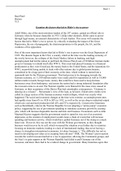Raul 1
Raul Patel
History
Y13
Examine the factors that led to Hitler’s rise to power
Adolf Hitler, one of the most notorious leaders of the 20th century, gained an official role in
Germany when he became chancellor in 1933. Unlike other dictators, Hitler came to power
through legal means, an unusual characteristic of such leaders. This essay will examine the
factors that led to Hitler’s rise to power, by critically evaluating the impact of the Great
Depression, the use of propaganda, his charisma/promises to the people, the SA, and the
weakness of his opposition.
One of the most important factors that led to Hitler’s rise to power was the Great Depression of
1929. The disaster began in the USA; a country which at the time was the leading economy of
the world, however, the collapse of the Stock Market, failure in banking, and high
unemployment had led the nation to pull back the Dawes Plan (Loan of 50 billion German marks
given to Germany to rebuild itself after WW1). This event had placed Germany in a financial
predicament as they were forced pay the money back to the United States, and the reparations for
WW1, meanwhile being unable to trade with other nations due to global protectionism;
considered to be a huge part of their economy at the time, which without it, turned into a
mammoth task for the Weimar government. This had proven to be damaging towards the
German economy, as 11,100 million marks were yearly paid for reparations as well as 18,000
million marks towards foreign loans, money that could have been used to keep German
businesses away from bankruptcy, and ensure the nation had a strong industrial foundation after
the recession came to an end. The Weimar republic were blamed for the mass crisis caused in
Germany, as their acceptance of the Dawes Plan had catastrophic consequences. “Germany is
dancing on a volcano” – Stresemann’s view of the loan, as he knew if short-term credits were
called in a large section of the German economy would collapse, which was exactly what
happened. The social and economic changes at the time were extreme, as unemployment rates
had rapidly risen from 6% in 1928 to 30% in 1932, as well as the severe drop in industrial output
which saw coal and steel production fall 42% and 51% respectively. Conservative historians
such as Borchhardt, criticize the Weimar Republic for not adopting a “prime pump” economic
policy; suggesting the use of government spending to stimulate economic growth by creating
jobs, which will increase disposable income and kick start business. Economists such as John
Maynard Keynes suggests that the government needs to spend its way out of an economic
depression, as the creation of employment would create a chain of events that will increase
spending and business activity, which would have pulled Germany out of the slump at a much
faster rate. However, this was not the case with the Weimar government, as they thought
business would recover by its self, which worsened the situation even further due to countries
focusing on domestic markets, leading to a lack of international trading, thus never having a
chance to strengthen international economies, let alone Germany’s. “The difficulty lies not so
much in developing new ideas as in escaping from old ones”-JMK. The Weimar’s poor reaction
towards the world recession had led to a rise in opposition, allowing the Communist groups, and
the Nazi’s to gain support as the Weimar Republic had failed to pull Germany out of the
recession, and knew there had to be a radical change in government. Many historians agree that





